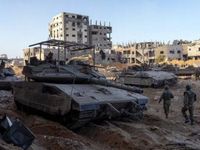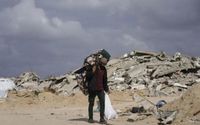On Friday, March 21, 2025, Israel's Defense Minister Israel Katz made strong declarations regarding the ongoing hostage crisis involving Hamas, indicating that Israel could annex portions of the Gaza Strip if the militant group does not release the remaining hostages. This statement has intensified the already fraught situation in the region, with Katz asserting a definitive course of action should Hamas continue its refusal to comply.
Katz, as reported by The Times of Israel, stated unequivocally, "If Hamas continues to refuse to release the hostages, I have ordered the IDF to seize additional territories, evacuate the population, and expand the security zone around Gaza to protect Israeli communities and IDF due to Israel's constant control of this territory." This declaration highlights Israel's intention to escalate its military engagement significantly unless the situation changes regarding the hostages.
The minister's comments come against a backdrop of heightened military activity. Katz revealed his directive to the Israel Defense Forces (IDF) to acquire more areas of the Gaza Strip, effectively extending what Israel terms a 'security zone'. The implication is clear: Israel is prepared to exert greater territorial control as it presses Hamas to concede to its demands. He added, "As long as Hamas continues to refuse to [release the hostages], it will lose more and more land that will be annexed to Israel." This positions the hostage crisis not only as a humanitarian issue but as a significant leverage point in the ongoing conflict.
This rhetoric emerges following Israel's strategic suspension of electricity supplies to the Gaza Strip on March 9, 2025. This measure was instituted to apply additional pressure on Hamas, which is holding approximately 59 Israeli hostages. The escalation of hostilities has roots in the ceasefire agreement reached on January 15, 2025, which took effect on January 19. That agreement outlined a three-phase process aimed at reducing tensions, including a complete ceasefire, troop withdrawals from dense population centers, and gradual hostage exchanges.
The first phase, completed earlier this month, resulted in the release of more than 30 Israeli hostages in a trade for hundreds of Palestinian prisoners. However, challenging negotiations emerged when, on March 1, 2025, Hamas publicly rejected Israel's intended extension of the ceasefire's first phase, stating there were no discussions regarding the next steps in the process. The group’s representative, Hazem Kassem, confirmed that negotiations for subsequent phases were non-existent, further complicating the situation.
Katz's statements serve to punctuate the urgency of the situation: The military campaign against Hamas is moving into a more aggressive phase. He emphasized that Israel would "intensify" efforts, including expanding ground operations, until the hostages are freed and Hamas faces significant defeat. The IDF appears prepared for a protracted conflict, matching the grim outlook that the hostage situation will only worsen without immediate action.
With tensions escalating, Katz also noted Israel’s strategy of applying both military and civilian pressure, such as relocating the population to southern Gaza and utilizing a controversial plan proposed by U.S. President Donald Trump for the voluntary relocation of Gaza residents.
The geopolitical ramifications of Katz's declarations are monumental. Observers note that threats of annexation are not new in Israeli politics, but the explicit linkage to hostages demonstrates an aggressive use of leverage that may invite significant international backlash. As the conflict continues, both sides remain entrenched in their positions, with the plight of the hostages serving as a poignant reminder of the human cost involved.
This evolving situation underscores the complexities inherent in Israeli-Palestinian relations, where military strategy, humanitarian issues, and political maneuvering often collide. With Israel asserting its rights to expand territory in reaction to hostage situations, the question remains how this will affect peace efforts and the humanitarian situation in Gaza.
As the world watches, the critical question is whether peace talks can resume, and if a sustainable resolution to the ongoing conflict—including the unresolved issue of hostages—can be achieved. Given the current landscape, the challenges appear substantial, leading many to fear that more aggressive military actions may lie ahead.



